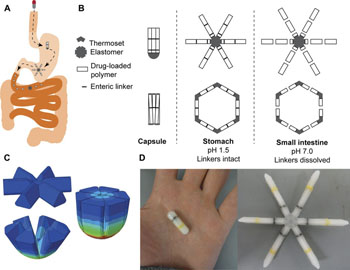Ultra-Long Acting Pills Could Help Eradicate Malaria
By Daniel Beris
Posted on 30 Nov 2016
A novel capsule that delivers a sustained therapeutic dose over a month could help treat malaria and other parasitic infections, according to a new study.Posted on 30 Nov 2016
Developed by researchers at Brigham and Women's Hospital (BWH; Boston, MA, USA) and the Massachusetts Institute of Technology (MIT, Cambridge, MA, USA), the oral capsule comes pre-compressed to the size of a caplet. Once inside the stomach, it unfolds into a star-shaped structure too large to pass through the pylorus and exit the stomach; the design does; however, allows food to continue passing through the digestive system. Upon dissolution of the macrostructure, the components safely pass through the gastrointestinal tract.

Image: Prototype dosage forms of ivermectin (Photo courtesy of Brigham and Women\'s Hospital).
To test the capsule's real-world applications, the team used both mathematical modeling and animal models to investigate the effects of delivering ivermectin, a drug used to treat malaria. The capsule contains polymers and other materials mixed with the ivermectin to allow the drug to slowly melt away out of the material over time. According to the researchers, the drug diffused for up to two weeks with no evidence of gastrointestinal obstruction or mucosal injury; continued development could provide the drug for one month or longer. The study was published on November 16, 2016, in Science Translational Medicine.
“We designed the capsule to pause its transit in the stomach to allow for more controlled drug delivery and absorption, before passing through the GI tract without any harm,” said corresponding author gastroenterologist C. Giovanni Traverso, PhD, of BWH. “Some of the challenges we face in getting the capsule in place are the 'ship in the bottle problem' and preventing the capsule from passing through the rest of the tube. The pylorus is about two centimeters in diameter so we designed our system to be four centimeters when it opens.”
“We want to make it as easy as possible for people to take their medications over a sustained period of time. When patients have to remember to take a drug everyday or multiple times a day, we start to see less and less adherence to the regimen,” concluded Dr. Traverso. “The gastrointestinal tract is a strong, durable passageway through the body. Being able to swallow a capsule once a week, or once a month, could change the way we think about delivering medications.”
Ivermectin is effective against many types of parasites, such as head lice, scabies, river blindness, strongyloidiasis, and lymphatic filariasis, among others. It has the added bonus of helping to keep malaria-carrying mosquito populations at bay. Discovered in 1975, Ivermectin works by causing an increase in the permeability of the cell membrane, resulting in paralysis and death of the parasite.
Related Links:
Brigham and Women's Hospital
Massachusetts Institute of Technology













.jpg)
